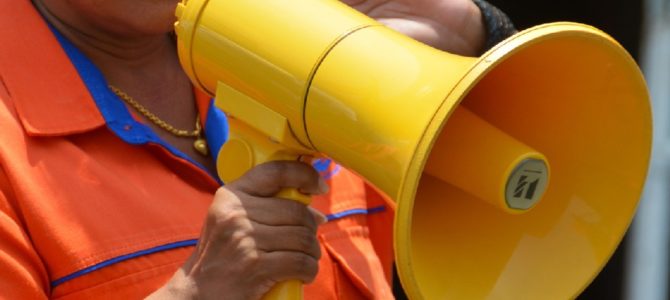
The American Association of University Professors is blaming a “right wing assault on higher education” for the removal of a teacher from her post in the fall of 2017, after she violated school policy in protesting a conservative group on campus.
The AAUP assessment of her removal in a report on the incident is ridiculous. Footage of Courtney Lawton verbally harassing recruiters for Turning Points USA at the University of Nebraska at Lincoln went viral last year. Lawton was a grad student and part-time lecturer there at the time. She approached the booth with a sign reading, “Just Say No to Fascism,” and referred to a female recruit as a “neo-fascist Becky” in a tirade.
“Neo-fascist Becky right here,” she says in the footage. “Becky the neo-fascist right here … She wants to destroy public schools, public universities, hates DACA kids. No KKK, no neo-fascist USA … Fight white nationalism.”
Some Nebraska legislators were upset by Ms. Lawton’s statements, but it’s not the legislature that drove UNL to remove Lawton from her teaching duties. She was removed because of the university’s own rules regarding faculty conduct.
The problems with her statements fall into two categories. The first category are statements that appear to be personal attacks against a female student sitting at the TPUSA table. The second category are clearly political statements. Let’s dispense with the political statements first.
Chanting “No KKK, no neo-fascist USA … Fight white nationalism,” and carrying a sign denouncing fascism is protected speech. Numerous Supreme Court rulings have held such statements are protected and public employees cannot be fired, face retaliation, or be discriminated against, for such utterances. However, the first group of statements are more troubling.
Lawton may have run afoul of UNL’s core value statement by calling the TPUSA organizer a “Becky,” twice. “Becky” can be a derogatory term for white women that conveys both racial animus and gender bias. The Urban Dictionary provides several possible definitions of a “Becky,” none of which are complimentary.
It appears from a video of the incident that the “Becky” comments were directed at the individual, not at TPUSA. UNL found Lawton’s statement to be inappropriate, and said it’s unacceptable behavior for a faculty member to taunt a student.
Much of the media attention has focused on academic freedom and Lawton’s role on the faculty, but not on her dual status as a student, which results in the neglect of an important element to the story.
The TPUSA student may have been the victim of racial epithets, or gender bias. Such incidents usually warrant an investigation by the university’s bias response team. Findings from a bias response team can have dire consequences for students, up to and including expulsion. Given that typical bias investigation proceedings are secret, even at public universities, however, it is doubtful we will ever learn the results of an investigation, if any investigation occurred at all.
Academic freedom is seen by those outside of the academy as a smoke screen allowing faculty to say anything they like without consequences. It’s the academic equivalent of a get out of jail free card. In this case, UNL found that it wasn’t. Their administrative rules on faculty conduct superseded the rules of academic freedom. Although AAUP’s statement on academic freedom does not limit content, it does advocate for appropriate restraint and respect for others in public speech.
Sadly, restraint and respect are long gone. Twitter, and other social media providers, have facilitated that. Too many in the academy have embraced the vernaculars of social media, engaged in abusive speech, and have tragically abandoned their roles as public intellectuals responsible for fostering civil discourse.
A faculty member calling a white woman a “Becky” does not qualify as respectful. A student saying the same thing should, according UNL’s own rules, trigger a visit from the bias response team as well. But bias response teams are dangerously subjective. They chill free speech because students can get in trouble, or be expelled, for saying the wrong thing. This the exact opposite of academic freedom.
The Solomonic task of parsing speech allowed under academic freedom, but prohibited, and potentially punished, by bias response teams, is folly. Universities should foster more speech, not less, and disband bias response teams, and eliminate the speech codes they enforce. They are incompatible with academic freedom. Students should be free to make mistakes, but faculty should be held to a higher standard when interacting with students.
Free speech can be ugly and uncivil. People and organizations say outrageous, galling, and controversial things, as is their right. So do faculty. However, academic freedom comes with more responsibilities than does speech made outside of the academy. The AAUP recognized this in 1940, and many universities agreed with those sentiments then, and today.
It is time to drop the smoke screen and recommit to the foundations of academic freedom, in general, and respect for others, in particular. In Lawton’s case, the AAUP seems to be advocating for speech without consequence, but their own rules indicate academic freedom is not speech without responsibility. UNL determined as much and acted correctly by removing Lawton from her teaching duties.









